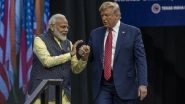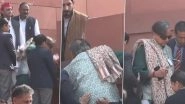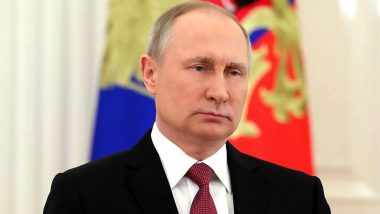Calgary, September 14: Ukrainian President Volodymyr Zelensky says Ukraine has recaptured thousands of square kilometres of territory from Russian forces in a matter of days in a counteroffensive near Kharkiv. Kyiv has been revelling in this battlefield success. Ukraine also says recent offensive operations in the south were a successful ruse to draw Russian forces away from the Kharkiv region.
In Moscow, President Vladimir Putin's government has so far been silent on unfolding events, although Russian state media has acknowledged Ukrainian successes. While there may be good military reasons for secrecy, Moscow's claim that the retreat of Russian forces in the region is part of a regrouping for operations further south is damaging its credibility.
Russian forces have clearly retreated near Kharkiv. Not only to those in the West, but also in Russia, it appears that Putin has lost control of the situation.
War efforts publicly questioned Putin's popularity in Russia remains buoyant — as does support for his so-called special military operation in Ukraine. That support, however, is contingent upon a degree of success. SCO Summit 2022: PM Narendra Modi, President Vladimir Putin to Discuss Russian-Indian Cooperation in UN.
When prominent bloggers who support the war and Putin's lieutenant on the ground, Chechen leader Ramzan Kadyrov, start to publicly question how the war is going, even Putin has to take note. As the war currently stands, Russia has a big problem with manpower in Ukraine.
It's not that Russia doesn't have large armed forces — on paper, the Russian armed forces have more than 800,000 active personnel. However, a significant proportion of those troops cannot easily be sent to Ukraine.
About a third of Russia's active forces are conscripts. At the beginning of the war, Putin pledged not to send them to Ukraine or call up more reservists.
Not only are conscripts not supposed to serve abroad, but there are also ostensible safeguards against conscripts being sent into combat with insufficient training.
Some conscripts were apparently mistakenly deployed in Ukraine, but those who sent them have reportedly been punished. Attempts to increase the number of volunteers for the Russian armed forces — complete with significant financial inducements — have been only partially successful.
How the Russian government plans to increase the size of the armed forces by more than 100,000 personnel, as Putin has recently decreed, remains unclear.
Running short on soldiers Because so many of its soldiers cannot be deployed in Ukraine, Russia has had to turn to smaller units, known as Battalion Tactical Groups, made up of contract troops instead of using larger brigades and divisions.
Now, in the face of increasing Ukrainian strength and Russian losses, Russia is running out of soldiers. In principle, Russia's manpower problem could be easily solved. Putin could legally create the circumstances for conscripts to serve in Ukraine. Such a move might also justify calling up large numbers of reservists — those who have already served but are liable for subsequent call up.
The problem for Putin in changing the rules regarding troop deployment is that doing so would completely dispel any illusion that everything is under control in Ukraine. In the short term, that would undoubtedly damage his credibility and result in broken promises. Sending conscripts and reservists into Ukraine against their will would also be unpopular.
Mobilising reservists alone would perhaps allow Russia to use them to fill in for forces transferred from other parts of Russia to Ukraine, but those forces have no doubt already been significantly stripped of contract personnel. In many ways, the Russian population has now been primed to see the war in Ukraine as more than just a special military operation.
In July, Putin said the “collective West” is trying to undermine Russian influence in its own backyard through interference in Ukrainian affairs.
According to Putin, the West “organised and supported the unconstitutional armed coup in Ukraine in 2014 and then encouraged and justified genocide against the people of Donbas”.
Western involvement in Ukrainian affairs was portrayed by Putin as part of the West's imposition of “a model of totalitarian liberalism”. Western military and other support for Ukraine — including sanctions — have made plain that Russia is engaged in a proxy war with the West.
Changing the approach of the special operation in many ways would simply confirm what's already apparent, even to Russians. It's a major war, and it involves losses, defeats and setbacks.
What's Next?
In the short term, using conscripts or calling up reserves would be unpopular, particularly if Ukrainian territorial gains aren't stopped quickly. In the long term, however, it's reasonable to assume that if Ukrainian offensives can be halted without too many casualties, much of the Russian population might forgive Putin for an obvious escalation of the conflict.
Russian acceptance of using conscripts and reserves might be more likely now that Russian forces are largely on the defensive in Ukraine. Putin has other options when it comes to changing the rules on the use of conscripts to increase manpower. Accelerating the incorporation of Donetsk, Luhansk and even territory north of Crimea into the Russian Federation would be the sort of legal sleight of hand that would allow the deployment of conscripts there. That would, however, likely fuel Ukrainian and western resolve.
Some western observers have raised the spectre of Russia's use of tactical nuclear weapons, but that's premature. Nonetheless, Putin cannot in the near future carry on pretending that all is well for Russian forces in Ukraine. He's left with little choice but to accept that a dangerous escalation of Russian commitments in Ukraine has to take place if he is going to maintain domestic support for the war — and to win. It seems a question of when, rather than whether, these changes take place.
(The above story is verified and authored by Press Trust of India (PTI) staff. PTI, India’s premier news agency, employs more than 400 journalists and 500 stringers to cover almost every district and small town in India.. The views appearing in the above post do not reflect the opinions of LatestLY)













 Quickly
Quickly


